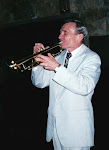This is our first book review at Pete Kelly's Blog and it's a monumental one. Ricky Riccardi's new book is an indispensible profile of a most neglected period in Louis Armstrong's career-his years with his All-Stars (1947-71). Louis' years with the All-Stars and his shows were often the victim of derogotory reviews by critics. They seemed to think that Louis had deserted jazz in 1929 when he started recording popular tunes. Louis' trumpet playing was also written off by most so called aficianados when he was still in full command of his horn. Ricky has done the world of music a great service by righting a terrible wrong in the history of Louis Armstrong and American jazz

Ricky is a 30 year old masters graduate of Rutgers University. He is an accomplished jazz pianist and has created an excellent blog on Louis- The Wonderful World of Louis Armstrong- He is also Project Archivist at the Louis Armstrong House Museum. We met via the blog and have become fast friends, Ricky is a passionate archivist on Louis' entire career but has concentrated on the All-Stars period for this book. He writes with passion, humor and great detail and care-the young man really knows his stuff. Many of Ricky's chapters and examples have appeared in the blog, the book would be the size of a bible if Ricky had his druthers but even in it's edited form there is a wealth of knowledge for both the veteran Armstrong fan or novice. When Louis switched from Big Band to combo format in 1947 he was looked as "coming home" to his roots. However the All-Stars were never a Revival band but mixed Louis' classic jazz pieces, his hits, current pop tunes and features for his sidemen- all wrapped up with the dynamic Armstrong personality up front.
We meet such early All-Stars as Jack Teagarden, Barney Bigard, Sid Catlett, Arvell Shaw and Earl Hines along with such later standout performers as Edmond Hall, Trummy Young, Peanuts Hucko, Billy Kyle, Mort Herbert, Tyree Glenn and Danny Barcelona.Riccardi also gives due to other All-Stars who didn't get the notoriety they deserved- players such as Russ Phillips, Mary Napolean, Big Chief Moore, Eddie Shu and Joe Muranyi. Louis' female vocaists Velma Middleton and Jewell Brown also get their innings.
Ricky is a master at dissecting key recording sessions and live performances during Louis' All Star days. He gives us plenty of musical highlights and examples of the genius of Armstrong's horn and voice. He never gets too technical and the book is always an enjoyable read.We also learn a lot about Louis the person. Yes he was a lovable, amiable consumate entertainer but nowhere the "Uncle Tom" he was labeled as. We see the human side of Louis' personality and find out that he wasn't browbeaten by manager Joe Glaser, but could be a very clever manipulator when he wanted his way regarding money, sidemen or material.
Every chapter is like spending 4 or 5 years in Louis' company. Pops' last engagement at the Waldorf Astoria is poignantly told. We truly feel for Louis and his need to keep playing and entertaining even while staring at death.This is a "Wonderful Book" and should be on the bookshelf of any serious musician, educator or fan.
What a Wonderful World is published by Pantheon Press and will be available in June of 2011. It can ordered thru Amazon and should be available at Barnes and Noble and Borders.
Enjoy the truly Wonderful World of Louis Armstrong and his All Stars.

No comments:
Post a Comment